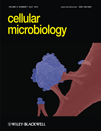
CELLULAR MICROBIOLOGY
Scope & Guideline
Pioneering Research in Cellular Microbiology
Introduction
Aims and Scopes
- Host-Pathogen Interactions:
Research exploring how pathogens invade, survive, and replicate within host cells, including the mechanisms of immune evasion and manipulation of host cellular processes. - Microbial Community Dynamics:
Investigations into the structure and function of microbial communities in various environments, focusing on interactions within the microbiome and their implications for health and disease. - Pathogen Virulence Mechanisms:
Studies aimed at identifying and characterizing the virulence factors of pathogens, and their roles in disease progression and host response. - Innovative Experimental Approaches:
Utilization of advanced methodologies such as in vitro models, live-cell imaging, and bioinformatics to study microbial behavior and host interactions at a cellular level. - Therapeutic and Preventive Strategies:
Research focused on developing new therapeutic and preventive measures against microbial infections, including drug discovery and vaccine development.
Trending and Emerging
- Host Immune Modulation by Pathogens:
An increasing emphasis on how pathogens manipulate host immune responses, particularly through the modulation of cytokine signaling and immune cell behavior. - Microbiome Research:
A growing body of work examining the role of the microbiome in health and disease, including its interactions with pathogens and implications for therapeutic interventions. - In Silico Approaches and Computational Modeling:
The integration of computational methods, including molecular docking and simulations, is becoming more prevalent for predicting interactions between microbial factors and host systems. - Emerging Infectious Diseases:
Research related to newly identified pathogens and the mechanisms through which they cause disease, particularly in the context of zoonotic infections and global health. - Advanced Imaging Techniques:
The adoption of cutting-edge imaging technologies to study live-cell interactions between pathogens and host cells, enhancing our understanding of cellular dynamics during infection.
Declining or Waning
- Traditional Antibiotic Resistance Studies:
Although antibiotic resistance remains a critical issue, the focus on traditional resistance mechanisms has waned in favor of exploring novel resistance pathways and alternative therapeutic strategies. - Static Microbial Models:
Research utilizing static models of microbial behavior has decreased, with a move towards more dynamic and complex systems that better mimic in vivo conditions. - Single Pathogen Studies:
There is a noticeable reduction in papers dedicated to the study of single pathogens in isolation, as the field shifts towards understanding polymicrobial interactions and the broader context of microbial communities.
Similar Journals

Emerging Microbes & Infections
Elevating global health through open access research.Emerging Microbes & Infections is a premier open access journal, published by Taylor & Francis Ltd since 2012, dedicated to advancing the understanding of microbial infections and their implications in human health. With an impressive Q1 ranking across multiple categories—including Drug Discovery, Epidemiology, Immunology, and Infectious Diseases—this journal is at the forefront of research in the microbiological sciences. Covering a diverse range of topics, it serves as a vital resource for researchers, healthcare professionals, and students alike. The journal's commitment to open access ensures worldwide dissemination of cutting-edge findings, fostering collaboration and innovation in tackling challenges posed by emerging infections. As part of the thriving academic community in the United Kingdom, Emerging Microbes & Infections plays a crucial role in shaping the future of infectious disease research and public health.

Nature Microbiology
Transforming Insights into Impactful DiscoveriesNature Microbiology is a premier journal published by NATURE PORTFOLIO that has firmly established itself within the realms of microbiological research since its inception in 2016. Based in the United Kingdom, this prestigious journal specializes in the intricacies of applied microbiology, cell biology, genetics, immunology, and medical microbiology, making it a cornerstone for academics and professionals alike. With an impressive Scopus ranking placing it in the top tier across various relevant categories—such as rank #3 in Genetics and #2 in Applied Microbiology—it underscores the journal’s commitment to high-quality, impactful research. Although it operates under a subscription model, Nature Microbiology's broad Open Access policy facilitates greater dissemination and visibility for its authors. The journal's objectives are centered around publishing cutting-edge advancements that enhance our understanding of microbial life, its interactions, and applications in health and disease. As a Q1 journal across multiple disciplines, it holds immense significance for researchers, professionals, and students enthusiastic about the latest innovations and breakthroughs in microbiology.
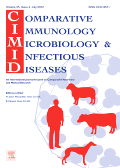
COMPARATIVE IMMUNOLOGY MICROBIOLOGY AND INFECTIOUS DISEASES
Pioneering Discoveries in Infectious Disease ResearchComparative Immunology Microbiology and Infectious Diseases, published by Elsevier Science Ltd, is a prominent journal dedicated to advancing the fields of immunology, microbiology, infectious diseases, and veterinary sciences. Established in 1978, this journal has become a vital resource for researchers and professionals alike, with a commendable impact factor that reflects its significance in academia. The journal, available in both print and electronic formats (ISSN: 0147-9571, E-ISSN: 1878-1667), stands out for its commitment to disseminating innovative research findings, particularly through its categorization in Q2 and Q3 quartiles across various related disciplines as of 2023. The journal aims to provide insightful comparative analyses that enhance our understanding of host-pathogen interactions, immune responses, and disease manifestations. With a global readership base, it serves as a platform for collaborative discourse among scientists and professionals, ultimately contributing to the improvement of health outcomes worldwide.
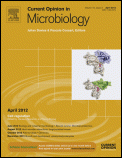
CURRENT OPINION IN MICROBIOLOGY
Elevating understanding in the dynamic world of microbes.CURRENT OPINION IN MICROBIOLOGY is a prestigious academic journal published by CURRENT BIOLOGY LTD, dedicated to advancing the field of microbiology through timely and insightful reviews. With an ISSN of 1369-5274 and an e-ISSN of 1879-0364, this journal has established itself as a leading source of knowledge in various subfields, consistently achieving a Q1 ranking in Infectious Diseases and Microbiology for 2023. Operating from the United Kingdom, CURRENT OPINION IN MICROBIOLOGY serves a critical role for researchers, clinicians, and students alike by disseminating groundbreaking findings and fostering discussions that shape the future of microbiological research. The journal's rigorous selection process ensures that only high-quality articles are published, reflecting its strong impact factor and high percentile rankings across relevant Scopus categories. Although it does not follow an open-access model, its comprehensive scope and valuable contributions to the medical and scientific community underscore its importance as an essential resource for advancing our understanding of microbial sciences.

TRENDS IN MICROBIOLOGY
Empowering Researchers with Cutting-Edge Microbial KnowledgeTRENDS IN MICROBIOLOGY is a premier academic journal published by CELL PRESS, renowned for its high-impact research contributions in the fields of microbiology, infectious diseases, medical microbiology, and virology. With an impressive impact factor and a notable Scopus ranking—placing it in the top tiers of its categories, including a remarkable Q1 status in multiple disciplines—this journal is essential for researchers, professionals, and students aiming to stay at the forefront of innovative microbial research and ongoing advancements in pathogen biology. Since its inception in 1993, TRENDS IN MICROBIOLOGY has provided a platform for thought-provoking reviews and critical insights, fostering discussions that shape the future of the microbiological sciences. Based in the United Kingdom, TRENDS IN MICROBIOLOGY continues to lead the way in disseminating vital knowledge within the global scientific community.
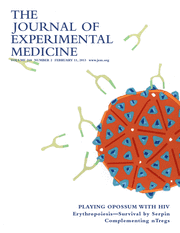
JOURNAL OF EXPERIMENTAL MEDICINE
Transforming Insights into Therapeutic StrategiesJOURNAL OF EXPERIMENTAL MEDICINE, published by Rockefeller University Press, is a renowned peer-reviewed journal dedicated to advancing the field of experimental medicine since its inception in 1896. With an impressive impact factor and categorized in the Q1 quartile for Immunology, Immunology and Allergy, and Miscellaneous Medicine, this journal stands at the forefront of medical research and innovation. It provides a prestigious platform for scholars and practitioners to disseminate groundbreaking findings that drive the understanding of disease mechanisms and therapeutic strategies. While the journal is not open access, it maintains high visibility and engagement within the scientific community, fostering collaboration among researchers, professionals, and students alike. The journal's consistent ranking in the top percentiles of Scopus illustrates its significant impact and commitment to excellence in medical research.
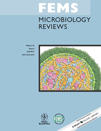
FEMS MICROBIOLOGY REVIEWS
Transforming Insights into Actionable ScienceFEMS Microbiology Reviews, published by Oxford University Press, is a leading journal in the field of microbiology, with a notable impact in related disciplines such as infectious diseases and medicine. Since its inception in 1989, this esteemed journal has grown to occupy a prestigious position, consistently ranking in the first quartile (Q1) in various categories, including Infectious Diseases, Medicine (miscellaneous), and Microbiology. With an impressive Scopus ranking of #13 in Microbiology and #25 in Infectious Diseases, it is recognized for its high-quality and impactful reviews that bridge the gap between fundamental microbiological research and practical applications. Aimed at researchers, professionals, and students alike, FEMS Microbiology Reviews offers critical insights and comprehensive analyses, making it an essential resource for those engaged in the dynamic study of microbial life and its implications for health and disease.

Frontiers in Cellular and Infection Microbiology
Leading the charge in microbiological excellence.Frontiers in Cellular and Infection Microbiology, published by FRONTIERS MEDIA SA, is a leading Open Access journal that has been at the forefront of microbiological research since 2011. Located in Switzerland, this journal aims to provide a platform for innovative and impactful studies in various domains including immunology, infectious diseases, and medical microbiology. With an impressive range of quartile rankings—Q1 in Infectious Diseases, Microbiology, and Microbiology (medical), and Q2 in Immunology—as of 2023, it positions itself as a highly reputable source in the academic community. Furthermore, its Scopus rankings highlight its significance within the respective fields, with top percentiles in key categories, making it an essential resource for researchers, professionals, and students alike. As an Open Access publication, it ensures that vital findings are accessible to a global audience, fostering collaboration and advancement in science.

MOLECULAR MICROBIOLOGY
Illuminating the Molecular World of MicrobesMOLECULAR MICROBIOLOGY is a prestigious academic journal published by Wiley that has been at the forefront of research in the fields of microbiology and molecular biology since its inception in 1987. With an impressive Q1 rating in Microbiology and a Q2 rating in Molecular Biology for 2023, this journal serves as a vital platform for disseminating high-impact research that advances our understanding of microbial processes and interactions at the molecular level. The journal's ISSN is 0950-382X, and the E-ISSN is 1365-2958, making it easily accessible to a global audience of researchers, professionals, and students. Though not an Open Access journal, MOLECULAR MICROBIOLOGY remains committed to providing valuable insights and fostering knowledge exchange in the academic community. Situated in the United Kingdom and indexed in prominent databases like Scopus, the journal holds a strong standing, with current rankings reflecting its influential role in the academic landscape. Researchers in the field are invited to contribute and engage with cutting-edge discoveries that will shape the future of microbiological sciences.

ACTA MICROBIOLOGICA ET IMMUNOLOGICA HUNGARICA
Shaping the future of microbiological inquiry.ACTA MICROBIOLOGICA ET IMMUNOLOGICA HUNGARICA is a distinguished academic journal published by AKADEMIAI KIADO ZRT, focusing on significant advancements in the fields of microbiology, immunology, and infectious diseases. Established in 1994, this journal serves as a vital platform for researchers, professionals, and students keen on exploring the complexities of microbial interactions and immune responses. With a current Impact Factor reflecting its rank within the Q3 categories for Immunology, Microbiology, and Infectious Diseases, it retains a critical position in disseminating innovative research. Although not open access, the journal provides extensive insights disseminated through various academic databases, ensuring a broad reach within the scholarly community. Its convergence over three decades indicates a robust commitment to excellence in scientific inquiry and knowledge sharing. As it moves towards the future, ACTA MICROBIOLOGICA ET IMMUNOLOGICA HUNGARICA continues to uphold its legacy of fostering collaborative research initiatives that contribute to the understanding and treatment of microbial diseases globally.